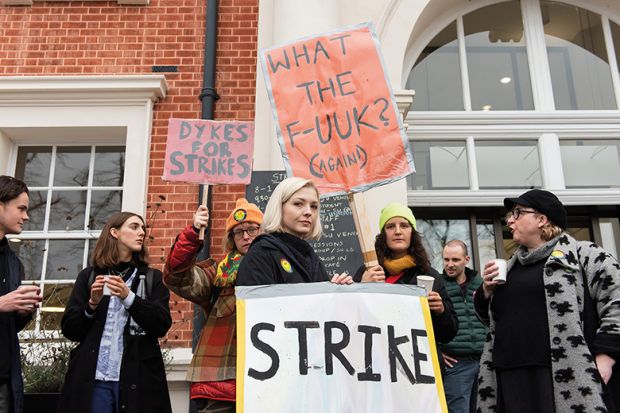The University and College Union’s decision to opt for a “middle way” in its industrial action strategy offers the best chance of uniting its membership and claiming some sense of victory in the UK sector pay dispute, commentators said.
Following weeks of debate, the union’s higher education committee called 18 days of strike action through February and March on a timetable that was still to be announced at the time of writing. A marking and assessment boycott is planned for April.
While this is not the “indefinite” walkout that some more radical voices had called for, it is still a significant escalation on the three days of strike action held in the autumn term. More than 70,000 UCU members across 150 universities could participate.
“It is an escalating and serious response to the lack of serious movement from our employers,” said Vicky Blake, a former president of the UCU and a widening participation officer at the University of Leeds.
“I think this is a bit of a ‘middle way’, promoted…to hold everyone together,” said Glen O’Hara, professor of modern and contemporary history at Oxford Brookes University.
“There’ll be lots of colleagues who simply couldn’t afford, and therefore just couldn’t go along with, an indefinite action. I just think that would have fallen apart.
“This, combined much more strategically with a threatened marking boycott to hold in reserve, seems like a strategy that might work – at least to some extent.”
The UCU announced the strategy as it rejected the initial pay offer from the Universities and Colleges Employers Association (Ucea), which would have increased pay by around 5 per cent on average.
Professor O’Hara said wages were the “one area where movement is possible” but argued that the union had “muddied the waters by pursuing so many ends at once”. Securing meaningful action on a national level in areas such as job security would be “enormously complex” so “declaring victory will be hard”, he said.
“I was a bit surprised that the employers upped their pay offer so soon, and that shows that union pressure is, to some extent, working,” Professor O’Hara added.
“I suspect that the offer will go a bit higher still once we get down to the crunch point in the spring and early summer.”
Roger Seifert, emeritus professor of industrial relations at Wolverhampton University, said the union’s calculation was that “once the employers begin to move to a better pay offer, although still inadequate, then they will move again as the wall has been breached”.
However, employers “may feel that UCU has overreached itself with this latest call to arms and that support will wither away as loss of pay and general financial pressures build up”, he added.
后记
Print headline: ‘Middle way’ on strikes could unite members




